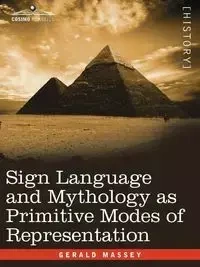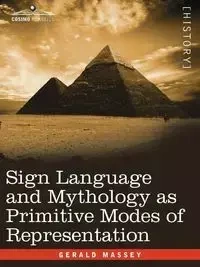Sign Language and Mythology as Primitive Modes of Representation - Gerald Massey
Sign Language and Mythology as Primitive Modes of Representation - Gerald Massey
AutorzyGerald Massey
EAN: 9781605203034

Bez ryzyka
14 dni na łatwy zwrot

Szeroki asortyment
ponad milion pozycji

Niskie ceny i rabaty
nawet do 50% każdego dnia
Niepotwierdzona zakupem
Ocena: /5
Marka
Symbol
071FDH03527KS
Kod producenta
9781605203034
Rok wydania
2008
Elementy
48
Oprawa
Miekka
Format
21.0x28.0cm
Język
angielski

“Myth-making Man” did not create the Gods in his own image. The primary divinities of Egypt, such as Sut, Sebek, and Shu, three of the earliest, were represented in the likeness of the Hippopotamus, the Crocodile, and the Lion; whilst Hapi was imaged as an Ape, Anup as a Jackal, Ptah as a Beetle, Taht as an Ibis, Seb as a Goose. So it was the Goddesses. They are the likenesses of powers that were super-human, not human.... A huge mistake has hitherto been made in assuming that the Myth-Makers began by fashioning the Nature-Powers in their own human likeness.
—from “Sign Language and Mythology as Primitive Modes of Representation”
It goes unappreciated by modern Egyptologists, but it is embraced by those who savor the concept of a “hidden history” of humanity, and those who approach all human knowledge from the perspective of the esoteric. Gerard Massey’s massive Ancient Egypt: The Light of the World—first published in 1907 and the crowning achievement of the self-taught scholar—redefines the roots of Christianity via Egypt, proposing that Egyptian mythology was the basis for Jewish and Christian beliefs.
Here, Cosimo proudly presents Book 1 of Ancient Egypt, in which Massey argues that “primitive man” found no human agency in the phenomena of the natural world, which led to a woeful misinterpretation of Egyptian hieroglyphics by the Greeks and Romans as well as a misunderstanding of the essence of Egyptian mythology. As a consequence, Massey contends, a deep fount of wisdom of the ancients has been lost, and he goes on to reveal how it can be rediscovered.
Peculiar and profound, this work will intrigue and delight readers of history, religion, and mythology.
British author GERALD MASSEY (1828–1907) published works of poetry, spiritualism, Shakespearean criticism, and theology, but his best-known works are in the realm of Egyptology, including A Book of the Beginnings and The Natural Genesis.
EAN: 9781605203034
EAN: 9781605203034
Niepotwierdzona zakupem
Ocena: /5
Zapytaj o produkt
Niepotwierdzona zakupem
Ocena: /5
Napisz swoją opinię

